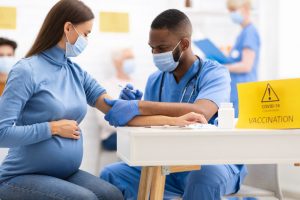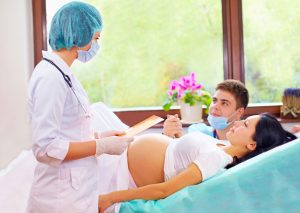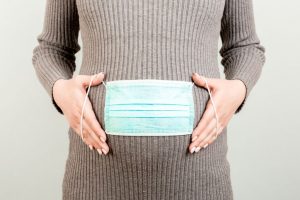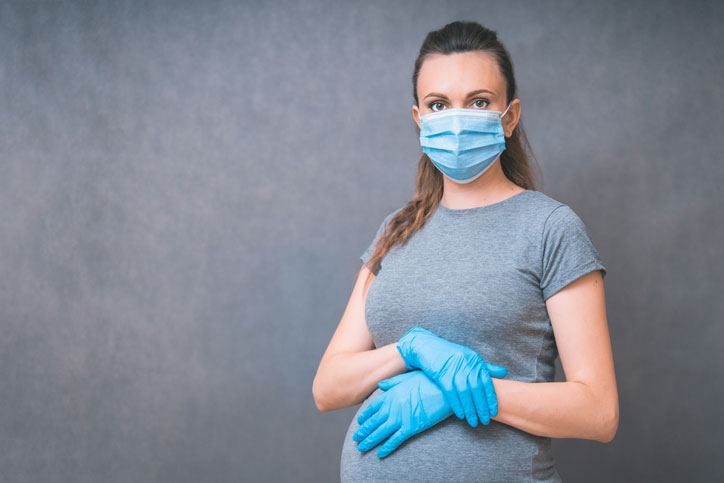By Laurel Johnson
Reviewed by Abbie Jacobs, RN, BSN
Pregnancy is a time of joy and anticipation for many people, and giving birth requires a lot of prepping and planning. The continued COVID-19 pandemic adds another layer of complication to this process and has left many parents with questions around delivery room and hospital safety, close contact with their babies, visiting policies and a whole host of concerns that didn’t exist pre-pandemic.
We’ve compiled some of the most common questions parents have, along with data-driven info from the American College of Obstetricians and Gynecologists (ACOG), the American College of Nurse Midwives (ACNM), the Centers for Disease Control and Prevention (CDC) and other medical experts.
QUESTION: How does pregnancy affect my risk of dying from COVID-19?
ANSWER: According to CDC, pregnant people are at increased risk for severe illness, complications and death from COVID-19. They’re more likely to end up in the ICU than non-pregnant people and are more likely to need a ventilator. COVID-19 may also raise the risk of pregnancy complications, such as pre-term birth (that is, birth before 37 weeks). Existing pregnancy complications, like gestational diabetes, raise these risks. Still, ACOG stresses, the overall risk of severe illness and death for pregnant people is low.
The best way to protect yourself is to take common-sense precautions, such as:
- Restrict contact with people who don’t live with you and keep 6 feet of distance when you do interact.
- Minimize trips outside your home as much as possible.
- Wear a mask and ask others to do the same, in all face-to-face interactions with people outside your home. Make sure the mask covers your nose and mouth completely.
- Wash your hands often. Use soap and water, and scrub for at least 20 seconds. Use hand sanitizer (at least 60% alcohol) when soap and water aren’t available.
Q: I’m pregnant and I think I have COVID-19. What now?
A: If you suspect you have COVID-19, contact your healthcare provider within 24 hours, CDC advises. Write down your symptoms, keeping a record of when they started and how they progress. Most people have mild symptoms and can recover at home. Mild symptoms include, but aren’t limited to, fever or chills, cough, fatigue, body aches, loss of taste or smell, nausea or vomiting and diarrhea. If you feel any of the following symptoms, get emergency help:
- Trouble breathing
- Persistent pressure in the chest or chest pain
- Confusion or delirium
- Trouble staying awake or waking up
- Pale, gray or blue-tinted skin, lips or nail beds (this symptom will be less obvious in people with darker skin tones)
Q: Does COVID-19 affect an unborn baby?
A: Research in this area is still early, and experts have drawn few conclusions so far. There have been a few cases of COVID-19 in infants where transmission likely happened before birth. However, this seems rare. Some studies suggest that COVID-19 increases the risk of preterm birth and stillbirth, but others have found this is not the case.
Ultimately, there’s much we don’t know about COVID transmission throughout pregnancy. Most infants who test positive for COVID-19 likely contracted it through exposure with an infected person after birth.
Q: Are the COVID-19 vaccines safe for pregnant people?
 A: They seem to be, but research is still ongoing. The mRNA vaccines do not contain live coronavirus, so they cannot give the recipient COVID-19. Vaccine trials include people who are pregnant, and researchers are monitoring them closely. As of now, no adverse reactions have been observed in either animal or human trials of the vaccines.
A: They seem to be, but research is still ongoing. The mRNA vaccines do not contain live coronavirus, so they cannot give the recipient COVID-19. Vaccine trials include people who are pregnant, and researchers are monitoring them closely. As of now, no adverse reactions have been observed in either animal or human trials of the vaccines.
Research in this area is still emerging and the decision to vaccinate is a personal one, so discuss any concerns you have with your healthcare provider. Together, you can make the right decision for yourself and your baby.
Q: Is it safe to give birth in a hospital?
A: In a word, yes. ACOG stresses that the safest place to give birth is still a hospital or accredited birth center. Hospitals have put rigorous protocols in place to prevent coronavirus transmission in the hospital and keep parents and infants safe.
However, adds the ACNM, where to give birth is a highly personal choice, and you have control over this experience. Many parents are opting for planned home births for a variety of reasons related to COVID-19 and personal safety. If you’re considering a planned home birth, talk to your healthcare provider or midwife about your specific situation. ACOG strongly recommends against a planned home birth if:
- You are carrying multiples.
- Your baby is breech or in a position other than head-down.
- You’ve previously delivered by C-section.
- You live farther than 15-20 minutes from the nearest hospital.
Q: Will I have to wear a mask during labor?
A: This will vary from hospital to hospital and patient to patient. Some people who have tested positive for COVID-19 have been asked to always wear a mask, even during labor and delivery. Others have reported that while hospital staff remain masked, parents can be unmasked while in their hospital rooms. Talk to your healthcare provider and your birthing facility about your specific situation and their requirements around masking.
Q: Will I be separated from my baby after birth?
A: Again, this will vary. Some hospitals have closed overnight nurseries entirely, opting to have infants room-in with their parents after delivery. Parents who have tested positive for COVID-19 may be asked to wear a mask while holding and nursing their newborns.
Most experts agree that skin-to-skin contact directly after birth is so important for infant development that the benefits of that close contact largely outweigh the risks of COVID-19 for newborns, especially if parents are diligent about handwashing and wearing masks. Talk with your healthcare team about these concerns ahead of time.
Q: Will a support person be allowed in the delivery room?
 A: This is a common concern, especially after early lockdown procedures banned support people from delivery rooms. Horror stories of women laboring alone were prevalent in those days, but hospitals have generally eased up on this restriction. Still, most limit it to one support person, and don’t allow visitors for any reason. This can be a difficult decision for parents who have both a partner and a midwife or doula, so be sure to discuss your concerns with your healthcare team in advance.
A: This is a common concern, especially after early lockdown procedures banned support people from delivery rooms. Horror stories of women laboring alone were prevalent in those days, but hospitals have generally eased up on this restriction. Still, most limit it to one support person, and don’t allow visitors for any reason. This can be a difficult decision for parents who have both a partner and a midwife or doula, so be sure to discuss your concerns with your healthcare team in advance.
Your support person may be confined to your room, unable to run errands or wander the halls, so keep that in mind as you prepare. Overnight bags should include everything you may need, including clothing, medication, reading material and snacks.
Q: Is it safe to breastfeed my baby?
A: Breastfeeding is a highly personal choice, but most experts agree that breastmilk is the best nutrition for newborns. The virus that causes COVID-19 has not been detected in breastmilk, according to CDC, so even parents who have tested positive for COVID-19 should feel confident either nursing their babies or expressing breastmilk with a pump.
If you’ve tested positive for COVID-19, wear a mask while you breastfeed, or whenever you’re within 6 feet of your baby. Regardless of your diagnostic status, always wash your hands before touching and holding your baby and ask others to do the same.
If you have COVID-19 and choose to pump breast milk:
- Use your own breast pump, not a rented or shared one, if possible.
- Wear a mask while pumping.
- Wash your hands for at least 20 seconds before pumping and before touching the pump or bottles.
- Follow instructions for cleaning the pump after each use. Make sure to clean every part that comes in contact with breastmilk.
- If another caregiver lives in your house and they do not have COVID-19, consider having them feed the expressed milk to your baby. Ensure they wear a mask during all close contact with the newborn.
Q: Should I prepare masks or face shields for my newborn?
 A: No. According to the CDC, masks and face shields are not safe for children younger than 2 years. A mask or shield could increase the risk for sudden infant death syndrome (SIDS) in infants, whereas the risks of coronavirus infection in newborns are relatively low. Most babies who test positive for COVID-19 have mild or no symptoms, CDC reports.
A: No. According to the CDC, masks and face shields are not safe for children younger than 2 years. A mask or shield could increase the risk for sudden infant death syndrome (SIDS) in infants, whereas the risks of coronavirus infection in newborns are relatively low. Most babies who test positive for COVID-19 have mild or no symptoms, CDC reports.
Q: What are the signs of COVID-19 in infants?
A: Reported signs of COVID-19 in newborns include fever, lethargy, runny nose, cough, vomiting, lack of appetite and labored or shallow breathing. If your baby develops symptoms like these, or if your baby is exposed to a person infected with COVID-19, contact your child’s healthcare provider right away. If your baby has trouble breathing, turns blue or is unresponsive, call 911.
Q: How can I keep my newborn safe during their first months of life?
A: Follow much the same precautions as you do for yourself:
- Limit your baby’s contact with anyone outside your home.
- Maintain 6 feet of distance between your baby and anyone who doesn’t live with you.
- Ask anyone in contact with your baby to wear a mask the entire time. Ensure masks cover the mouth and nose entirely.
- Make sure everyone in contact with your baby practices good handwashing hygiene. Wash your hands for at least 20 seconds with soap and water before touching or holding your baby and use hand sanitizer when soap and water aren’t available.
Finally, bring your baby in for scheduled newborn visits. These are essential to check your baby’s growth and development, and to answer any questions you may have.
Find more in-depth information on the CDC’s website.

